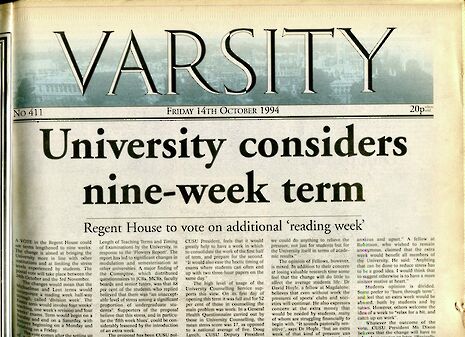The perennial problem?
In her final instalment, Courtney Landers uncovers the problem with drinking societies, intermitting and the recurring debate over a mid-term reading week

Several weeks into an investigation of our university’s welfare systems I found myself looking at a diagram of their structure, and was reminded of something our Pro-Vice-Chancellor (PVC) for Education, Graham Virgo, had said to me: “If you stop and think, we would never create something like this from scratch.”
In my quest to interview the most senior figures in the university’s mental health networks, I largely ‘leapfrogged’ from interview to interview. Initially I had tried to use the university Reporter and website to determine who was who, with little success. Luckily for me, each interviewee recommended another, slowly describing the shape of two committees dedicated to health and welfare issues. In the end, finding out about these committees became a major part of my investigation, since we hear very little about them, despite the enormous amount of work they do.
The University Committee on Student Health and Wellbeing (SH&W) is a subcommittee of the General Board’s Education Committee. Chaired by Diana Wood, Dean of the Clinical School, its members include college representatives, health professionals such as college nurses and community GPs, and representatives from university services. This committee is only two years old; it replaced the Student Health Services Committee that used to run the dentist and college nurses. The intention was to establish something with the core aim of promoting wellbeing by discussing issues, then formulating and implementing policy. Indeed, Chair Diana Wood told me that the committee has become a focus of mental health discussion in the university.
“It’s been very useful to pull all these things together in people’s minds, like the difference between mental health and illness, so it has been quite useful.”
The Senior Tutors’ Welfare and Finance Committee is a subcommittee of the Senior Tutors’ Committee. That larger group is composed of senior tutors or equivalent from all 31 colleges plus the Vice-Chancellor and the PVC for Education. Welfare and Finance (W&F) essentially acts as one of three smaller ‘standing working parties’ that debate issues as they emerge, creating policy for consideration and adoption by the main committee. Senior Tutors are joined on W&F by the Graduate Union President and the CUSU Welfare Officer. Most work is driven by current issues; what the senior tutors have noticed or been told, what student representatives relate, or what is simply ‘in the air’ from student campaigns. For example the Senior Tutor at Churchill, Richard Partington, told me that a recent discussion of more universal training for tutors was prompted by a report from the student advice service: “It was clear that some tutors were going beyond the triage that we thought was advisable, so we wanted to refocus things there.”
The two committees work closely together, assisted by a shared secretariat structure. For example, one of the first issues tackled by SH&W was sexual harassment, something which W&F had already begun to move on. According to Dr Wood, this will now lead to further work on student drunkenness.
“We think about the drinking culture in order to try and get people to think about their mental health, and their wellbeing.”
This will include movement on drinking societies and sports clubs, but not from the usual angle: “I don’t think there’s enough about the sort of student who just wants to run around with a hockey ball on a Saturday afternoon for the hell of it. And if they go to one of these clubs which has got a problem, they might go once and then never go again because they’re put off by it. And then might become a couch potato for three years. So it’s about those cultures, and that’s difficult. That’s going to be really difficult.”

Having had some difficulties with student representatives attending meetings on sexual harassment in the past, my interviewees are keen to work more productively with CUSU, seeking a relationship that is more collaborative than antagonistic. Geraldine Dufour (the head of the University Counselling Service) commented: “It’s a real shame to work with a rep on a committee, such as tackling issues around sexual assault, and then find a very critical article saying that nothing is being done. I find that really disheartening.” This is particularly so, given that committee business is open, and according to Richard Partington, “there’s no reserved business. Students need to feedback.”
The work of the committees is often driven by student campaigns. In the case of a reading week, says Richard Partington, there had been discussion of examining workloads for some time before the campaign gave it a “bit of a nudge”: “Campaigns often do that; it’s a welcome nudge, pushes things up the priority list.” Given the recent attention by student media, I spent some time discussing the idea of a reading week with my interviewees. According to Graham Virgo, the idea is receiving serious attention: “The official line is we are considering it, the university has no plans to change it. But we haven’t just said no, we are considering it...we’re looking at it, we are looking at it very seriously to see what the options might be.”
However, potential issues abound; a reading week would suit some students and departments but might disrupt the learning and research of others. Any shortening of vacations would reduce the time available for internships and volunteering opportunities. Alternatives might include a long ‘reading weekend’, the possibility of a week or two with less work rather than none, or a lengthening of vacations to allow consolidation, development and catch up. Ultimately though, the biggest benefit of the campaign for a reading week is that it has allowed many committees the space to more closely examine student workload. Alongside a ‘once in a generation’ review of the entire examination process, a working group on workload has been established within SH&W by PVC Graham Virgo, with students represented by both CUSU and GU presidents. The group is considering workload from every angle, says Virgo: “Maybe there’s too much teaching going on. Maybe the syllabuses are too big. Maybe the examination processes are too unwieldy.”
The committees also provide a chance to discuss and tackle potentially thorny issues. Intermission, for example, presents multiple problems with no easy answers. The Senior Tutor at Wolfson, Dr Jane McLarty, described how difficult it is to balance welfare with accommodation needs: “It is difficult, if you’ve got a mature student and they’re living in college, they’ve made college their home for three years, and they need to take some time out, actually it probably is healthier for them to have a break from that environment, but where do they go?” Intermission is one of the most sensitive situations college staff deal with. As Dr McLarty explained, “as Senior Tutors we’ve got to have a duty of care for the whole community.”
That role can sometimes require a tightrope walk between acknowledging the legitimacy and seriousness of mental illness and at the same time emphasising that just because someone is mentally ill doesn’t mean their actions are always acceptable. Richard Partington told me “certainly I’ve been in that situation here in this college where we’ve had students who were creating a lot of difficulties for other students. It wasn’t their fault, they were not well. Nonetheless, you’ve got to think about the wider community and the problems that those students are suffering from, and then somehow find a resolution. If these things were susceptible to hard and fast rules, we’d have hard and fast rules.”
According to Graham Virgo, the university is working towards making intermission clearer and easier, having just produced a new guide for ‘fitness to study’ decisions to try and consolidate and simplify the procedure for deciding a student must take time out: “The big thing is just making sure the procedures are as straightforward and transparent as possible, whatever language is used, because they’re not well and we’re well aware they’re not. So there’s a lot of work being done to ensure that students who need to take time out know exactly how to do it.”
Ultimately, it became increasingly evident from my interviews that the ‘people in power’ in our welfare systems are incredibly attuned to the importance of mental health provision at this university. Graham Virgo has only held the position of Pro-Vice-Chancellor for Education for 13 months, but in that time has already seen changes in the way the university considers mental health: “What I have now seen is mental health and wellbeing put right at the top of the education agenda. There are other things up there as well, but it really is taken incredibly seriously.”
In some ways, the biggest challenge for the university and its committees now is to publicise the work they are doing. In my final interview for this investigation, when I asked Diana Wood if she had anything she would particularly like students to know, she simply said: “I think we want them to know that we’re listening to them.”
 News / Fitz students face ‘massive invasion of privacy’ over messy rooms23 April 2024
News / Fitz students face ‘massive invasion of privacy’ over messy rooms23 April 2024 News / Cambridge University disables comments following Passover post backlash 24 April 2024
News / Cambridge University disables comments following Passover post backlash 24 April 2024 Comment / Gown vs town? Local investment plans must remember Cambridge is not just a university24 April 2024
Comment / Gown vs town? Local investment plans must remember Cambridge is not just a university24 April 2024 News / Climate activists smash windows of Cambridge Energy Institute22 April 2024
News / Climate activists smash windows of Cambridge Energy Institute22 April 2024 News / Copycat don caught again19 April 2024
News / Copycat don caught again19 April 2024





